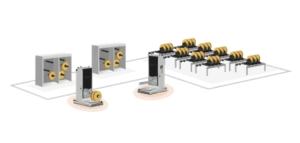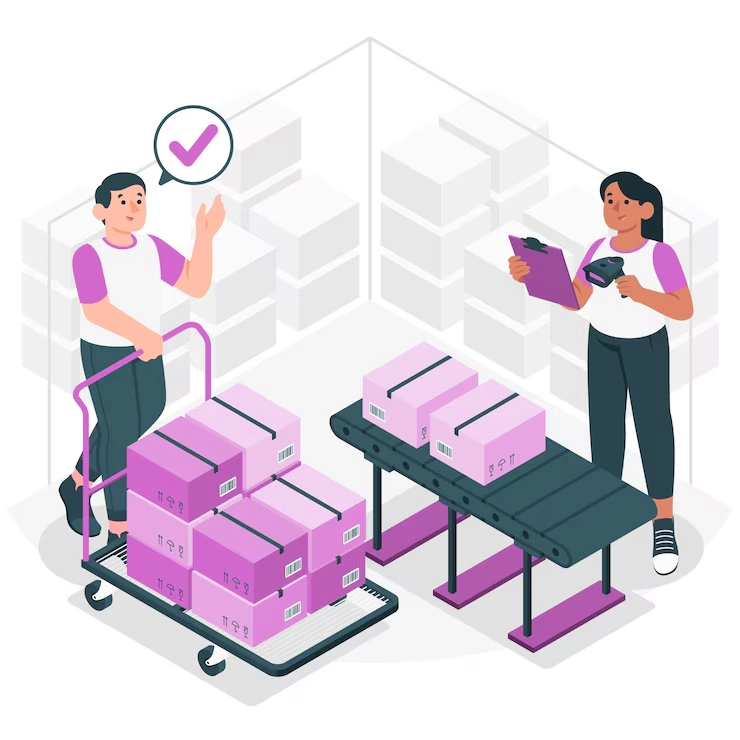
Intelligent warehousing transforms manufacturing by enhancing effectiveness and slashing expenses. As plants tackle growing needs, clever setups provide a vital advantage. This article delves into how intelligent warehousing lifts output, outlines essential setup steps, and explains why WESAR excels as a leading supplier. Uncover the game-changing strength of intelligent warehousing for your processes.
What Is Intelligent Warehousing and Why Does It Matter?
Intelligent warehousing reshapes current logistics. Let’s unpack its core.
Defining Intelligent Warehousing
Intelligent warehousing harnesses cutting-edge tools like AI, IoT, and automation to refine storage activities. Unlike old-school methods, it blends instant data and sharp devices to handle stock, smooth workflows, and sharpen choices in factory settings.
Key Features of Intelligent Warehousing Systems
- Automation: Machines and belts manage routine chores.
- Live Updates: Detectors monitor stock instantly.
- AI Blend: Smart forecasts boost organizing.
- Linkage: Ties storage setups to supply networks.
These traits make tasks quicker and wiser.
The Importance of Intelligent Warehousing in Modern Manufacturing
Factories crave accuracy and swiftness. Intelligent warehousing trims mistakes, hastens production rounds, and adjusts to shifting demands. It’s crucial for thriving in a tech-fueled arena. Plus, it meshes smoothly with plant routines.
How Does Intelligent Warehousing Enhance Manufacturing Productivity?
Clever setups yield clear wins in vital zones.
Streamlining Inventory Management
Real-Time Inventory Tracking
Using IoT detectors, intelligent warehousing delivers current stock updates. This stops overfills or lacks. It ensures supplies stay ready for production lines. So, manufacturing flows without hiccups.
Automation in Stock Replenishment
Smart systems reorder goods based on use trends. This shrinks delays. Machines foresee needs and refill before stocks vanish. Output climbs with little human effort.
Reducing Operational Costs
Minimizing Manual Labor Through Automation
Robots and guided carts swap out handwork. This cuts wage bills and curbs slip-ups. Factories pocket savings while steadying results.
Energy Efficiency in Warehouse Operations
Wise setups tweak lights, warmth, and gear use. Power-saving plans trim utility costs. Operations turn slimmer and eco-friendlier—a gain for earnings and the planet.
Improving Supply Chain Efficiency
Faster Order Fulfillment Processes
Intelligent warehousing quickens picking and packing via automation. Shipments leave sooner, pleasing clients and keeping production on pace. It’s a straight output lift.
Enhanced Collaboration Across the Supply Chain
Instant data links join vendors, storage, and plants. This aligns tasks, easing jams. It ensures raw goods arrive right on time for factory demands.
| Benefit | How It Works | Impact on Output |
| Stock Monitoring | Current updates via detectors | Halts production stops |
| Expense Cuts | Automation trims labor, power use | Boosts profit edges |
| Supply Flow Ease | Quicker orders, tighter teamwork | Speeds full task chain |
How Can Manufacturers Transition to Intelligent Warehousing?
Shifting to smart setups needs careful plotting and action.
Key Steps for Implementing an Intelligent Warehouse System
Assessing Current Warehouse Operations
Begin by reviewing your layout. Spot clogs, hand-done jobs, and weak spots. This starting point reveals where intelligent warehousing can shine most.
Choosing the Right Technology Solutions
Select gear that suits your goals—consider AI programs, robots, or IoT gadgets. Options like WESAR’s IWMS-1000 bring custom fits for smooth blending.
Overcoming Common Challenges During Implementation
- Budget Worries: Kick off small with growable setups to control costs.
- Crew Prep: Teach staff new tools to simplify uptake.
- Pause Risks: Roll out changes in stages to dodge production breaks.
With smart planning, these snags turn into progress paths.

Why Choose WESAR as Your Trusted Partner for Intelligent Warehouse Management Systems?
WESAR stands tall in intelligent warehousing answers.
Overview of WESAR’s Expertise in Intelligent Warehousing Solutions
WESAR focuses on sharp storage setups for factories and shipping. Per their site, they fuse top-notch tech with field savvy to craft reliable, effective answers suited to today’s production needs.
Key Features and Benefits of WESAR’s Systems
- IWMS-1000: Cutting-edge software for live oversight, found at this link.
- Growth Fit: Setups expand with your work.
- Help: Skilled advice ensures easy rollout.
These perks lift output and trim expenses.
Success Stories with WESAR’s Clients
WESAR has lifted factories globally. Take one mid-sized plant—it slashed order handling time by 30% with WESAR’s IWMS-1000. Another cut power bills by 15% via smart automation. These triumphs show WESAR’s punch.
Conclusion: The Transformative Impact of Intelligent Warehousing on Manufacturing Operations
Intelligent warehousing ramps up factory output by refining stock control, slashing costs, and sharpening supply flows. It’s a smart leap for plants aiming to excel in a rapid world. With WESAR by your side, you tap into elite setups that bring results. Step into warehousing’s future now.
FAQs About Intelligent Warehousing
What Are the Primary Benefits of Implementing Intelligent Warehousing?
Top gains include swifter stock handling, reduced running costs, and sharper supply flow pace. These lift output and earnings for factories.
How Long Does It Take to Transition to an Intelligent Warehouse System?
Switch time differs—small setups might need 3-6 months, bigger ones up to 12-18 months. Staged launches and solid plans quicken it.
Is Intelligent Warehousing Suitable for Small-Scale Manufacturing Operations?
Yes, flexible options like WESAR’s fit small setups. They offer budget-friendly automation and data aids, matching pace with larger rivals.






